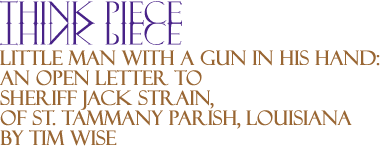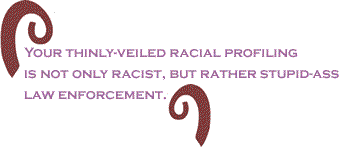
Dear Sheriff Strain,
I always liked Slidell, even before Lucinda Williams sang about
going there to "look for (her) joy." And my fond feelings
for the town were rekindled recently when I discovered that Grayson
Capps – with whom I went to Tulane in the late '80s, and who's quite
the singer-songwriter himself – had written a song about it too.
Well, sorta. It's really about a guy who's trying to get home to
his true love, but there's this big car wreck outside of Slidell,
caused by a woman who's drunk and talking on her cell phone. So
while he waits for the clean-up crew to carry away the carnage,
he sits on a barstool in one of the town's watering holes and knocks
back a few. More than a few, actually. I figure the car wreck is
a metaphor for the guy's life, or then again, maybe not. Like Freud
said, sometimes a cigar is just a cigar, and anyway, Grayson always
struck me as a pretty literal fellow, not given to undue irony or
flourish. I've got it on my iPod: good stuff.
The way I see it, ya' gotta love any place that gets a song written
about it – even Luckenbach, Texas. So although I never enjoyed that
interminably long drive across Lake Ponchartrain from New Orleans
when I lived down there, on the few occasions when I made it to
St. Tammany Parish, I always found the people to be nice. And considering
that St. Tammany is the parish home to Abita Springs, from which
place emanates some damned fine spring water, and even better beer,
well, what's not to like?
But today, I'm starting to wonder if maybe I should rethink my feelings
towards your Parish; perhaps even the "nice people" thing.
After all, those "nice people" elected you Sheriff, and
yet there you were on TV recently, saying that you and your deputies
weren't going to put up with any of the "trash"
from New Orleans coming to St. Tammany in the wake of Katrina
and its aftermath.
I know you probably think you're just looking out for the citizens
of your community. After all, you fashion yourself an important
man, without whom everything would go to hell in a hand-basket.
That shiny badge of yours, not to mention your gun, makes it official
too: Jack Strain is a big man. Of course, Barney Fife had a badge
and a gun, as did every member of the Keystone Cops, so, I suppose
importance (to say nothing of competence) is in the eye of the beholder.
And yes, I know those guys were fictional officers of the law, but
it appears you have a soft spot for fiction, as we'll see here shortly,
so keep reading.
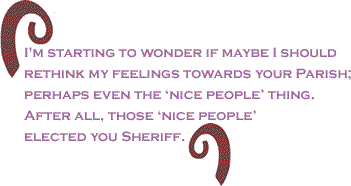
What exactly did you mean, Sheriff Jack, when you said that anyone
wearing dreadlocks or a "Chee-Wee" haircut would be paid
a visit by one of your deputies? (For those who don't know, a Chee-Wee
is a regional snack, not unlike Cheetos). Are certain hairstyles
now seen as probable cause for a stop-and-search in St. Tammany?
Under what creative interpretation of the Constitution – you know,
that piece of paper that trumps whatever it is you think the law
should be – do you figure such a policy is legal? Or do you just
not care?
Putting aside legality for a second, perhaps I can just address
you as a man, and a father. You see, I have two little girls: five
and three. Among the many challenges involved with raising kids
is trying to teach them not to say mean-spirited things about others.
You know how kids are, right? Always pushing the envelope with such
childish slurs as "poo-poo head" or "butt-face,"
or something they heard at pre-school, and which they don't realize
to be hurtful until a parent sits them down and explains that whole
Golden Rule thing. Maybe you've had this experience with your own
kids: trying to get them to follow the old maxim, "If you can't
say something nice, don't say anything at all," and then realizing
– as my wife and I have – that it's a lesson you'll be re-teaching
a lot, seeing as how once just isn't enough to make an impression.
Kids are like that: in one ear and out the other.
But how much harder must it be for parents to teach their children
proper behavior, and to teach them not to use hurtful words, when
they have as adult role models, people like...well, people like
you, Sheriff. People who refer to others of the human family as
"trash," as you did on at least a half-dozen occasions
in that interview. It's bad enough to ever call people by such a
dehumanizing slur – after all, trash is what we take to the city
incinerator and burn every week, or to the landfill to bury, so
consider, for a second the homicidal symbolism of your words – but
to do so when you yourself have likely never met any of the persons
for whom you reserved this verbal abuse makes it all the more vile.
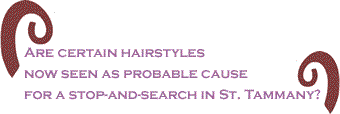
You began by speaking of the "trash" in New Orleans
rather generically, leaving us all to wonder who you might be speaking
of, not that we couldn't venture a guess. We know all the code words
y'all have in places like St. Tammany for poor black people, after
all. But then, just to make sure we hadn't misinterpreted, you clarified
things, specifying that the trash in question were folks from the
city's public housing projects, who you feared would be making the
trek to Mandeville or some such place, in search of opportunities
to ply their criminal trade, or new folks to victimize.
First, don't flatter yourself. The idea that the people of New Orleans
really want to come to St. Tammany Parish – thereby trading in one
of the most culturally vibrant and important cities in the history
of the cosmos for a place where the opening of a new Chili's is
cause for celebration – is more than a little silly. Please, remember
where you live: a Parish whose most famous resident is David Duke;
a Parish whose Republican Party Executive Committee several years
ago unanimously voted Duke – the nation's most prominent Nazi –
to be their chairperson. No, I don't think you need to worry about
too many black folks seeking out such a place to live. Of course,
if they did, the fact that you'd be more troubled by their presence
than the presence of the nation's most prominent Nazi (and convicted
criminal, seeing as how Duke recently spent time in jail for tax
evasion and fraud) says a lot about you and the values you hold
dear.

Secondly, while you take great pleasure in calling those who lived
in New Orleans public housing before Katrina trash, it  should
be noted that in some regards, they compare favorably to the folks
in your own backyard. So, for example, consider that according to
Census data, ten percent of your young people between 16-19 have
apparently dropped out of school, which is actually higher than
the percentage of dropouts among folks that age who lived in the
B.W. Cooper Homes, or the old Desire projects in New Orleans, and
roughly the same as the dropout rate for youth who resided in the
St. Bernard development. should
be noted that in some regards, they compare favorably to the folks
in your own backyard. So, for example, consider that according to
Census data, ten percent of your young people between 16-19 have
apparently dropped out of school, which is actually higher than
the percentage of dropouts among folks that age who lived in the
B.W. Cooper Homes, or the old Desire projects in New Orleans, and
roughly the same as the dropout rate for youth who resided in the
St. Bernard development.
Of course, you wouldn't be the first person to negatively (and inaccurately)
stereotype residents of public housing. It happens all the time,
most often coming from people who have never set foot in the places
about which they claim to know so much. I'm guessing that would
be true for you, Sheriff Jack.

But I've been in those places where the "trash,"
as you put it, live, and you might be surprised at how wrong your
preconceived notions are. I spent the better part of fifteen months
working with New Orleans public housing residents on various community
initiatives in the mid-90s, and had the occasion to meet the kind
of people you condemn. I've sat in their living rooms, and listened
to them talk about their hopes, fears and dreams. I've heard them
muster up more optimism in the face of crushing poverty than I could
likely conjure – hell, more optimism than I have on a normal day
now, even with all the privileges I've been afforded; and I've watched
them demonstrate more character, in spite of all the odds stacked
against them, than people in any other community I ever visited.
Oh, and I can tell you this, without fear of contradiction: I saw
far more drugs on my dorm floor at Tulane than I ever saw in the
projects, to say nothing of problem drinking. I heard of far more
sexual assaults at Tulane than in the housing developments when
I was in both places – not that the former were as likely to be
prosecuted, of course, or come to the attention of law enforcement
at all, for that matter.
Truth is, if you look at New Orleans public housing, and examine
some facts about the people who live there (or at least did before
the flooding) – as opposed to consulting your own uninformed biases
about the same – it's not hard to see that only an ignorant lout
or a real asshole would call the residents of such places trash.
Now don't get mad: since I'm fully prepared to let you figure out
which of the terms fits you better, I haven't actually called you
either, so I'm not in violation of that whole "say something
nice or don't say anything" rule that I so neatly promulgated
a while back.
First off, about half the residents of New Orleans public housing
prior to the flood were minors – they're kids, Sheriff. In the Iberville
development, forty-two percent were twelve years old or younger,
and twenty percent were younger than five. In St. Bernard, a third
were twelve or younger, and one in seven were under five years of
age. In B.W. Cooper, the numbers were thirty-six percent twelve
and younger, and 17.3 percent five or below. The same is true in
the other projects. So, what this means is that as of the 2000 census,
of the 15,000 or so residents of public housing (itself a very small
percentage of the city's black folks, or even black poor), about
7500 were minors, perhaps 5500 or so were twelve or younger, and
around 2500 were infants or toddlers. So, these are a large number
of the folks you just called trash. Children. I'm sure your momma
and your pastor would both be proud.
Oh, and I'm sure you'll say you didn't mean them. Sorta' like you
said you didn't want to call anyone names, and then proceeded to
call them trash and thugs, and make fun of their hairstyles by comparing
them to fried cheese puffs. Sorta like you said you and your deputies
didn't want to violate anyone's civil rights, right after you announced
you'd be stopping anyone wearing their hair in one of two styles
you know damned good and well are almost exclusively worn by black
folks. Which means you can say whatever you like about your intentions,
and I'll reserve the right to think you're lying.
So, you'll say you don't mean the kids, but rather, just their parents.
They're the irresponsible ones, you'll insist. But in truth, you'd
be wrong about the grown-ups too. So at least your ignorance is
consistently woven throughout your commentary, and God knows, there's
much to be said for consistency, Sheriff Jack.
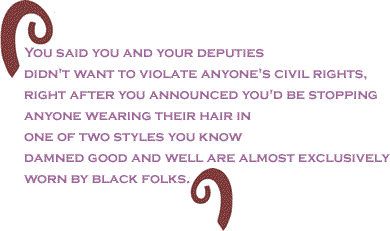
Not that you're interested, but the facts are these: Contrary to
conventional "wisdom," in most of the housing developments
and their surrounding New Orleans neighborhoods, prior to Katrina,
about six in ten households received income from paid employment,
while only about one in four received income from government "welfare"
programs. Even though the vast majority of residents in such places
were officially poor, only a small percentage received public assistance
in the form of cash support. In places like the old Desire and Florida
projects, sixty-one and sixty-nine percent of households, respectively,
had at least one person in them who worked at a paid job; and in
the case of Desire, only about five percent (or one in twenty households)
received money from public assistance programs, or so-called welfare.
Although it's true that most adults in public housing don't work
outside the home, when you exclude those who are elderly or disabled
– two groups that make up more than a third of adults in most cases
– it hardly seems fair to label the grown-ups in and around public
housing as irresponsible. A third of all persons sixteen or older
in St. Bernard, for example, worked full-time – same thing in B.W.
Cooper, or the Treme/Lafitte community, with a large number of the
remainder working part-time, trying to help make ends meet. The
clear majority of able-bodied adults in these places are either
working or looking for work, contrary to popular belief. And the
rest who don't work at a paying job, typically stay home so they
can care for small children: the kind of thing that gets a mother
labeled "good" and responsible, so long as she's white
and middle-class.
On a personal level, the strongest work ethic I ever witnessed was
that of a resident of New Orleans public housing with whom I had
the good fortune to work many years ago: a woman whose son was murdered
while she and I were working at the same organization, but who nonetheless
came in the very next day because, in spite of her grief, she had
a job to do. I don't know about you Sheriff Jack, but I've called
in sick because I was tired, and here was someone who felt it necessary
to show up to work, even in the immediate aftermath of one of the
greatest losses a mother can experience. Lazy? I don't think so.
I'd be willing to bet you've got deputies or administrative staff
out of the office today, right now, for less valid reasons than
that. I'd bet you've missed plenty of days of work fighting the
bad guys of Covington, for reasons that would seem quite pathetic
compared to losing a child.

And finally Sheriff Jack, getting back to your comments
in that interview, I really should point out that you've got some
nerve sweating the so-called criminal element in New Orleans anyway.
See, I hopped on your department's website today. Among other things,
that's where I was able to ascertain that your real name isn't Jack.
It's Rodney, for which "Jack" is not a typical nickname,
but I guess it sounded tougher, manlier, and so you went with it.
Good for you. Cops should have tough names. But anyway, back to
my point.
So, I'm checking out your website, trying to figure out what it
is you have against people with dreadlocks, and I'll be damned if
I didn't stumble across your Twenty Most Wanted list of alleged
perps. And, nothing personal, but it looks to me as though you've
got plenty of criminal types in St. Tammany, without having to worry
about imported black New Orleanians. Funny though, only two of the
twenty most wanted appear to have dreads, or any kind of particularly
black haircut.
No sir, no braids or cornrows on Jesse Buras, a fine upstanding
white member of your community, right there on Harbor Drive in Slidell,
who's wanted for DWI and possession of drug paraphernalia; or Tony
Beasley, also white, also lacking in Rasta locks, who failed to
appear in court after his third DWI. Now this one is especially
funny, seeing as how you criticized New Orleans for being soft on
criminals in your interview. After all, you seem to have a three-time
loser out there regularly pulling out of his driveway on Melody
Street, after downing a case of Milwaukee's Best, and still, you
haven't managed to lock him up yet. Way to go, Sheriff.
Or what about Jimmy Blackwell Jr., a real stand-up guy (white, no
"Chee-wee" hair), wanted for assault and battery, unlawful
entry into a residence and violation of a protective order. Sounds
like a domestic violence problem to me Sheriff Jack. How many times
have ya' been out there to his place on Nottingham Drive without
arresting him, anyway?
Or Kirk Cochran, who appears to not believe in paying child support,
or showing up to face charges over the same? Or Darwin Crowe, wanted
for aggravated battery? Or Randy Ezell, of Covington, who, among
other things, seems to fancy talking dirty to folks on the phone?
Or Walter DePriest, who is charged with being so unsatisfied with
his own life, that he's taken to stealing other folks' identity,
presumably for some financial gain?
Or the two white women y'all are looking for: one of whom is wanted
for passing bad checks (and who has a lovely tattoo of a devil on
her mid-section), and the other of whom failed to register as a
sex offender?
Yes sir, y'all got some real winners out there in St. Tammany, Mr.
Po-lice man. And some of 'em are bald, and some have short hair,
and some look like former Boy Scouts, and some definitely don't,
and some have facial hair, and then again, some are clean-shaven.
But even the black folks, who seem to scare you the most, don't
all look a certain way. A few are women, and none of the men look
anything like Bob Marley, truth be told. Which leads one to conclude
that your thinly-veiled racial profiling is not only racist, but
rather stupid-ass law enforcement, seeing as how your twenty most
wanted list seem to have more of a problem with receding hair lines
than anything else.

Oh, and I know that all of these folks I've mentioned
are presumed innocent until a jury or judge says otherwise. But
since it was you who said on TV that defense lawyers should be run
out of town – especially the kind who would defend New Orleans "trash"
– (again, you, with the deep and abiding commitment to the Constitution),
I figure you won't mind me speaking of them as if they had already
been adjudicated guilty.
I dunno, maybe you were just pandering to the David Duke types:
folks who left Jefferson Parish (the original New Orleans white
flight suburb) and moved to St. Tammany in recent years to get even
farther away from black people. Or maybe you'd had one too many
Abita Turbo Dogs before they stuck that camera in your face. Or
maybe you weren't pandering, or plastered: maybe you're just a jackass.
But please, the next time you think about wasting several minutes
of taxpayer-paid time in front of a news crew, remember that that's
time you could be spending tracking down devil-tattooed white check-kiters,
or serial drunk drivers like Tony Beasley – or, for that matter
the woman in Grayson Capps' song, whose inebriated driving led to
the death of five people. Bet she's white too, with nice white person
hair.
Of course, I realize his song is fictional. But given your attraction
to fabricated images – like your own fevered perceptions of black
New Orleanians – I'm guessing it's just as good as the truth for
the likes of you. You and all the drunk driving, cell-phone-in-the-car
talking, obscene phone call making, wife beating, identity-thieving,
joy-seeking neo-Nazis of St. Tammany Parish. Now that wasn't very
nice of me, was it?
Tim Wise is the author of White Like Me: Reflections on Race
from a Privileged Son (Soft Skull, 2005), and Affirmative
Action: Racial Preference in Black and White (Routledge, 2005).
He can be reached at [email protected] and his essays
can be read at www.timwise.org. |




